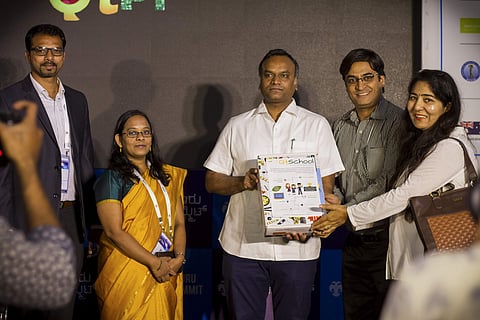

Education should not be restricted to only learning from books. Children should be encouraged to be innovative by making the best use of technology. We're not the only ones who believe this though. A few years ago, Jaison Leon, Raghunath Are and Anto Jerlin, who worked for reputed companies like Microsoft, Yahoo and Oracle as software engineers, came together to start a company, QtPi Robotics, that helps children learn about robotics in a fun way. The three co-founders believe that while computers and mobile phones have become an integral part of our lives, we're not too far away from the rule of Artificial Intelligence-powered physical devices. With its DIY Robotic kits, the start-up aims to inculcate skills in children that can help them create something new related to AI every day.
Jaison Leon, Co-founder of QtPi Robotics, says, "Nowadays, most jobs need creativity, the ability to experiment and interdisciplinary skills, which children need to be taught at a very young age. But most kids are addicted to computers and mobiles. It takes a lot of time to pull them out of this addiction and help them embrace their imagination. We spent two years experimenting with various methods to teach robotics and computer programming to kids who are as young as 7 years old. Some of our experiments failed. But now, we have our own methodology called as DESI (Design, Electronics, Software Integrated Innovation) to promote STEAM subjects (Science, Technology, Engineering, Arts and Mathematics) among kids." With the help of the DIY kits, the children design devices that can have a social impact.
Children at QtSchool are not taught overnight to design and develop devices, says Jaison, explaining, "Adding one's own creativity to an existing product is the first stage of innovation at QtSchool. This way, they have developed devices like voice-control home automation, agro-robots, military tankers, Google Map-integrated smart cane and a solar-powered smart tap. Our children are already at the first stage of creativity as they learn to modify the devices taught to them. They build their own mobile app to interact with their projects. We set up an environment in which kids can learn computational thinking through practice. As QtPi mentors are also contributors to product development, students get to learn from creators themselves. They are encouraged to work on their own ideas, design working prototypes with ABS building blocks and electronics components."
The start-up has tied up with a handful of high-end schools in Karnataka, Tamil Nadu, Andhra Pradesh and Maharashtra so far. "We work with schools only if they understand QtSchool’s holistic approach to STEAM education. Our market research showed that amateur players without adequate skills and multiple year contractual obligations have made some schools frown upon STEAM education. As first time entrepreneurs in the market, we were cautious in terms of thoughtless expansion. Unlike conventional teachers, STEAM mentors should possess multidisciplinary skill sets and keep them updated regularly. Over 10,000 children as young as six years old have experimented with QtSchool activities," he says. And not just private schools, the start-up wants to teach the same skills to children studying at government schools too. Their team is already working with the Government of Karnataka to run pilot workshops for 1,000 school children in Gulbarga, a city in Karnataka.
So as to stay ahead of the curve, the founders consistently add a set of new concepts and innovative DIY kits to their curriculum every year. "We keep adding cutting-edge technologies and concepts to our curriculum. Theme-based learning from Finland is the latest we are experimenting with. We are also experimenting with computer vision and simplifying Artificial Intelligence and Machine Learning courses for children. Our curriculum will see some upgrades in future days," he says, sounding confident. By 2019, QtPi aims to expand to Telangana, Delhi and other regions, and add a few more schools to their list. "We are expecting to tie up with 100 schools by 2020 and reach three lakh paid customers on our online platform. Geographically, we want to have our presence everywhere through franchises, co-creators and partners. We hope to see every child owning a kit, working on an idea, appreciating success and failure alike, and creating solutions to mankind," concludes Jaison.
